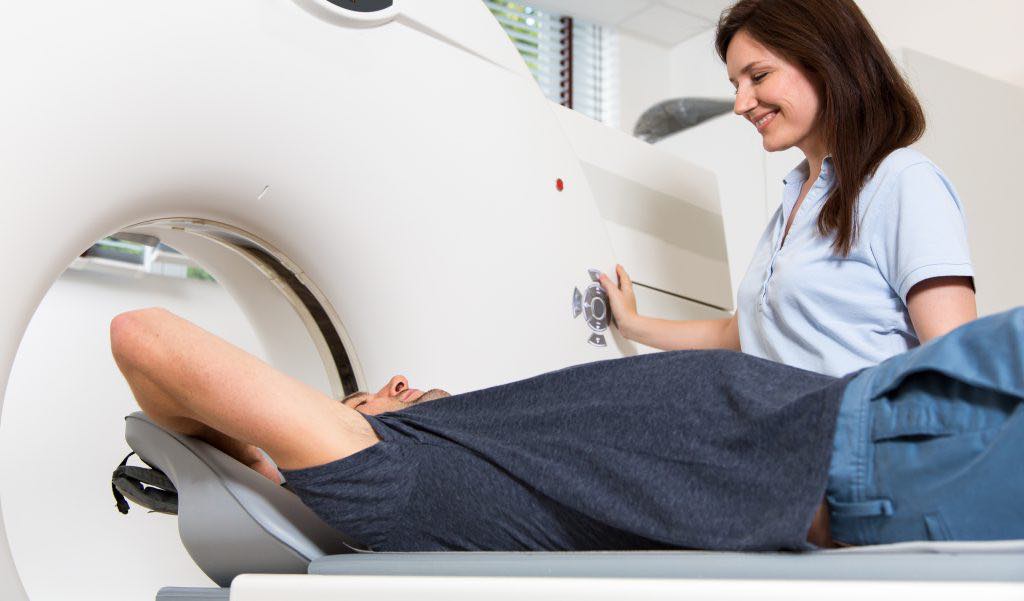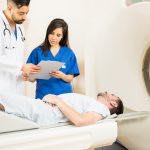In the United States there are over 70 million CT scans performed annually, reports the National Institute of Health. It’s important to know that, for some patients, there are side effects of undergoing a CT scan. Knowing what to look for before, during, and after your CT scan, especially if you have an adverse reaction, can be lifesaving. For some people, the likelihood of side effects occurring from a CT scan increases if they are allergic to the contrast dye used in some types of scans.
Learn more about CT scan side effects so you can prepare for your upcoming medical procedure.
What is a CT scan?
CT stands for “computed tomography,” and it uses a specific type of x-ray equipment that combines with computer imaging to get a cross-sectional look at your body. An x-ray is only able to detect bones with the brief outline of some organs, bones, and other tissues in the body. In comparison, a CT scan can give a view of organs, blood vessels, and bones. A physician can see cross-sections of your body with a CT scan as the imaging solution.
Medical scans and imaging are “directly linked to greater life expectancy and declining cancer death rates. Medical imaging exams are also generally less expensive and safer than invasive procedures, such as exploratory surgery,” reports Mayo Clinic. The potential for diagnosis and life-saving intervention that is possible after a CT scan does outweigh the side effects.
What are the most common CT scan side effects?
There are a few potential CT scan side effects that you should consider. One of the primary reasons for the effects is the exposure to radiation. A second culprit for causing side effects is the contrast dye used in certain scan types. The most common CT scan side effects are:
- Allergic reactions to the dye
- Anxiety pertaining to the procedure
- Birth defects
- Increased risk of cancer
CT scan side effect: allergic reactions to the contrast dye
The most common CT scan side effect is a specific form of allergic reaction to the contrast dye. There are two commonly used dyes for CT scans: barium and iodine-based dye. If you are sensitive or allergic to iodine, a reaction could involve everything from a rash to anaphylaxis, reports the University of California, San Francisco. Some of the measures you can verify your doctor is taking could include:
- Noting any risk factors for a reaction like allergies and asthma
- Using a preventative medication prior to the contrast for patients with an increased risk
- Adding the minimum amount of contrast material possible for the imaging
- Discontinuing the use of certain kidney medications prior to the scan
- Making sure your IV is also hydrating to prevent any kidney damage
CT scan side effect: anxiety is a CT scan side effect that impacts many patients
Anxiety is one of the most common CT scan side effects that impacts people of all ages. For many patients, the anxiety is due to the uncertainty of diagnosis while others are claustrophobic in an enclosed space.
CT scans to track the recurrence of previously detected medical issues also cause anxiety. A study tracking long-term cancer survivors found there is real anxiety with CT scans. Also, the study, which was published in the Annals of Oncology, reports that “routine surveillance scans exacerbate underlying anxiety symptoms and fear of recurrence in survivors of aggressive lymphoma.”
Although this CT scan side effect is treatable with medication, doctor-patient communication, and coping techniques, it can be an issue for some patients.
CT scan side effect: birth defects
There is a known correlation between radiation and birth defects. Because of this, a pregnant woman should not get a CT scan, especially during the first three months of pregnancy. “Birth defects, which are often believed to be a major concern, only occur with much higher dose exposure in early pregnancy (the first three months),” says the Emergency Care Institute of New South Wales. The risk increases if the scan is on the abdomen. If there is any chance of pregnancy, the doctor may suggest a different test or put off the procedure for the duration of the pregnancy.
CT scan side effect: the risk of developing cancer from CT scans
In a Washington Post article, Sandra Boodman reveals that “like X-rays and PET scans, CT scans use ionizing radiation, which can damage DNA and cause cancer. Two other imaging technologies, MRI scans, and ultrasound do not use radiation.” There is a known medical risk of developing cancer after increased exposure to radiation and scans, reports Harvard Women’s Health Watch.
It is important to note there is a particular risk for children exposed to a CT scan. In a study conducted by the Institute of Health and Society at Newcastle University found that children and young adults did have “a small increased risk of leukemia and brain tumors in the decade following their first scan.” However, the risk of a CT scan is minimal compared to the diagnostic potential.
Ask your doctor questions about the procedure including:
- Will there be more scans in the future?
- Is the test medically necessary?
- Is there another option that does not include radiation?
- What are the specific concerns for my child?
Researchers believe that CT scans affect children more because of the rapid cell growth and division their bodies are undergoing at a young age. The National Cancer Institute estimates that the additional risk of developing fatal cancer from a scan is in 1 in 2,000, while the lifetime risk of dying of cancer is 1 in 5.
“Another risk of X-ray imaging is possible reactions associated with an intravenously injected contrast agent, or “dye”, that is sometimes used to improve visualization,” says the FDA.
The benefits outweigh the side effects of a CT scan
If your doctor does recommend a CT scan, it important that you weigh the ups and downs of the scan. In most cases, a CT scan is worth it in order to get the proper diagnosis and treatment. As an educated patient, be sure to ask your physician if the CT scan is necessary for diagnosis. The only way to prevent the side effects is to reduce your exposure while also caring for your health.
Need a CT scan but worried about the cost? You’re not alone. New Choice Health helps patients find fair prices for their CT scans, among other medical procedures. Compare facilities to find a fair, affordable cost for your CT scan today.







